endure. That gives them . their only chance in the worst
of the winter, when, again they may be forced to hasten south. Suddenly comes the hard frost. At the first cold breath of it the worms, have burrowed deep out of the way, and the earth in a single night is. bound as hard as adamant. White rime covers the meadow like a tablecloth, which not even the noontide can melt under the shadows of trees and along the north side of the hedgerow. The water in the gutters of the mead has been drawn up into a thin "cat's-ice," and the moisture in the ditch is hard as a bed of slate. Then the field- fares rise in a flock into the hawthorn-bush and strip off all the berries in a day. The briar and the holly also are quickly bare, and the hedgerows know, no ornament but the swinging catkins waiting for the hazel to put forth, its tiny red flowers at the first glimpse of spring. Or should bard frosts come very early, whilst apples still lie in the orchards or piled up in heaps under the trees, the fieldfares know where to go. They soon find out the fruit, and spoil by pecking more than they can eat. Although so shy by nature, when hunger-driven they will come near to the homestead, and even pitch on a waggon laden with fruit. Then if rat-traps are placed along the " raves " of the waggon—those ladderlike projecting wings which keep the load off the wheels—the birds may be caught by the score. They are very good eating, too, in, their winter fat, and were once highly esteemed, although now, like the wheatekir, they are little thought of. You may sometimes see them, however, in large towns hang- ing for sale in a poulterer's shop. There is no regular trade in them, and these are sent in with the larks. For the field- fares, unlike any other of the thrushes, will sometimes roost on the ground; and when fallows are netted for larks, they get caught up in the nets. The old manner of dressing them like a woodcock has changed. We have it on the authority of a sixteenth-century writer: "At the tyme of yeare the feldefares fede only on Juniper berries the people eate the feldefares undrawn." Now we scarcely eat them at all. Those that survive the frost, escape the net, and keep out, of the way of the holiday boy with his first gun, fly north in the spring, when their instinct tells them the cold weather has gone for good. Whether coming or going, may good luck attend their flight !
LETTERS TO THE EDITOR..
UNDER WHICH LEADER?
[To THE EDITOR OF THE "SPECTATOR:]
SIR,—The recent speeches of Mr. Chamberlain, and more especially that delivered by him at Bristol on Tuesday, must have opened the eyes of even the most tolerant of those Conservatives who, while sympathising with the principle of his Fiscal policy, yet cannot see eye to eye with him in its
detailed elaboration.
There must be thousands of Conservatives throughout the country who, while perfectly ready to support the party at the approaching General Election if led by Mr. Balfour, would not take the trouble to cross the road to record their votes for that party if Mr. Chamberlain is to be the dictator of the policy to be put before the electorate.
There cannot be the slightest doubt but that Mr. Chamberlain's speech at Bristol is intended to be a direct challenge to Mr. Balfour's appeal at Newcastle for "a policy of Fiscal Reform in which all Unionists may for practical purposes agree." In Mr. Chamberlain's opinion (an opinion which mast also be shared by those who do not agree with his policy in its entirety), no such "agreed" policy is possible, and his endeavour is therefore to make Conservatives swallow his own. Mr. Chamberlain has in unmistakable language clearly laid down what his programme implief, and if Mr. Balfour had from the inception of that programme been equally explicit as to the extent to which he would support it, the Conservative party would not find itself—as unfortunately is now the case- in the hopeless and humiliating position of not knowing where it stands.
The moment has come when a definite line must be taken on this question. It is manifest that a General Election cannot be far distant, and if the Conservative party is not to be entirely wrecked it must now be up and doing. Conservatives have too long allowed themselves to be, in the words of the present' Lord Salisbury, "dazzled by a great Imperial dream, which at present it is impossible to realise; and carried away by the enthusiasm of a very great but rather impulsiire statesman." If there is any real desire on their part to save that once glorious host from complete wreckage, they must free themselves at-once from the shackles of servitude which have for so long entwined them. There can be little doubt that unless some drastic action of this kind is taken, Mr. Chamberlain will force the official Conservative party to.adopt his policy as their own, and oust all those Conservatives from the party who do not blindly support that policy. Our leaders have, I venture to think, been guilty of grave errors in ignoring Mr. Chamberlain's pointed allusions to them in one of his latest speeches. His reference to the action of the party in Parliament last Session, when certain resolutions on the Fiscal question were brought forward by the Opposition, can scarcely be said to bear out his rather laboured protestations of his loyalty to Mr. Balfour and the Government ; and his attack on Lord Londonderry looked very much as if it were made in retaliation on his Lordship's scathing criticism of the Workmen's Compensation Bill when being piloted through the House of Lords.





















































 Previous page
Previous page